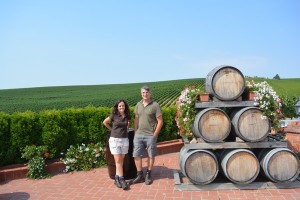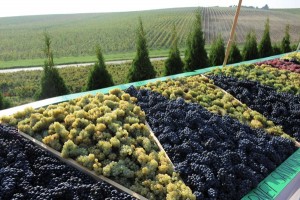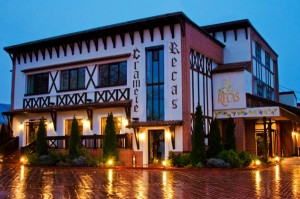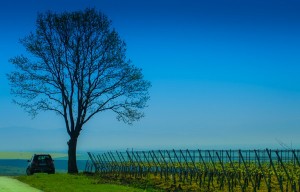Full name: Philip Cox
Role: Director at Recas Winery
DOB: 28.03.1968
Birthplace: Bristol
Twitter Handle: @cox_home
Website: http://www.recaswine.ro/
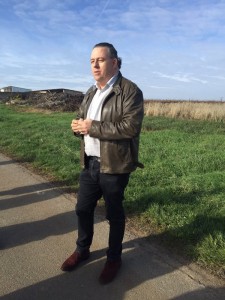
J: When it comes to food & drink, what’s good in your neck of the woods? You’re in Timisoara / Timiș County – right? (NB my Romanian geography is pretty terrible so please feel free to correct me if I am off the mark…)
P: Yes. The city of Timisoara is Romania’s 3rd biggest – in the west of the country close to Hungary and Serbia. The local restaurant scene is just going through a transformation and is still underdeveloped. At the moment the best places to eat here are Italian/Romanian fusion restaurants like Dama Verde, or modern Romanian like The Stejarul hotel just near Timisoara airport in Bazos.
My favourite Romanian foods are Salata de vinete (roast aubergine salad) Zacusca (a kind of tomato/roast pepper relish that people eat instead of sandwich spread), and a very local dish called Paturata which is a slow cooked potato based stew of ham hocks and folded little pasta parcels filled with cream cheese.
Your wife is the export manager right? What’s it like working with someone so close to you?
Well, I very much enjoy it, although I do concede that it is hard to switch off and relax sometimes when one of us is always thinking about work. The good side is that we have a lot of travelling to do, so if we didn’t do it together we would probably never see each other. Working closely together means that we have a lot of creativity – always bouncing ideas and solutions off each other.
My work is complimentary to Elvira’s as I am mainly involved in technical things – trying to get the right style of wine and packaging for her customers while she does sales and administration, which I hate doing.
What’s Romanian wine market like? Do Romanians themselves drink much wine? Do you do much international business? (asides from the UK – of which you export millions of bottles a year now?)
The Romanian wine market is chaotic and changing greatly right now. Romanians do drink a lot of wine (27 litres per person and there are 20 million of them!) and even in 2014 the country was a net importer of wine because local production wasn’t enough.
The overall knowledge about wine is sketchy but there is a fast growing set of people that are growing more and more interested in wine, especially in the big cities. This means wine is starting to be seen more as a social and sophisticated drink rather than as a basic food product that is drunk at every meal (which was the view most Romanians had 20 years ago).
Our company has always believed in having more eggs in more baskets, so we do a lot of international business – it’s about half of our bottled wine sales – which is unusual in Romania. We are the country’s largest exporter.
Markets that are going very well right now are the UK, Holland, Belgium, Germany, America – those are the biggest markets – but we sell well in all European countries, South Africa, Australia Japan, Canada… 25 countries in total and growing by 20% per year.
Could you tell us about your winemaking team? I read in Harpers a while back that it was almost entirely Australian-Spanish!
Hartley Smithers was born in Sydney Australia, graduate of the famous Roseworthy college near Adelaide. He has worked his whole life as a winemaker – making 2 vintages per year (north & south hemisphere) since he left uni more than 25 years ago, so he has never seen spring since the 1980s! And he has worked in all the world’s main wine producing countries – Chile, South Africa, Australia, Spain etc.
He has worked for us for more than 11 years now and has been absolutely central to the complete transformation of our vineyards, winery and wine style to a modern, science based approach to everything. Hartley works in our winter months for John Casella in Australia so he is always up to date on the latest changes to winemaking – which have come on thick and fast in the last few years.
Nora Iriate – from the Basque country in Spain. She did her Uni in Pamplona and Bordeaux and worked for many years in Navarra and Rioja in Spain. Later she worked in Australia and now she’s in Romania.
She is the most organised part of our winemaking team and is an extraordinary taster and blender of wines, and she keeps Hartley (who she married a few years ago) under control and pointed in the right direction!
You work on “I Heart” wines too? Could you tell us a little more about that and how that came about?
We work with Copestick Murray who are the inventors of I Heart Wines and our largest customer in the UK. We were one of the first wineries to develop wines for the I Heart range and it has been a big success with millions of bottles sold. The core values of the brand are very well suited to what our company does best – making great value for money wines, where the emphasis is on connecting directly with the customers to create a great product: quality wine in exciting packaging.
We think this is the way forward in the future and will get more people interested in drinking wine – people that would otherwise be put of by the traditional way of selling wine based on the appellation system. This can often provide confusing labelling and wines of inconsistent quality from within the same region, and with similar labels.
Where do you see the wine business headed in the next few years? Any trends or things you think we should be looking out for?
I think the wine industry is in a very competitive phase right now with a greater level of quality than ever before and new countries and regions coming onto the market. All of them fighting for shelf space and consumers.
This means each producer has to be very sharp and be aware of what the customers want and how we can communicate with them. Very important in this process is both social and traditional media, but also investing a lot of time and effort in our distributors and our communication with them about what we are selling.
Most of all I think it is about offering a consistently good product with improving standards and avoiding bottling any kind of wines with problems. Customers are very hard to loyalise – so letting them down is not an option.
What’s a ‘day in your life’ like? Could you give us an insight into the wine business?
It’s very varied. Summertime for me is spending weeks travelling dusty roads around Romania looking for grapes to buy, Autumn is crazy during the harvest where we are totally dependent on the weather… always trying to outsmart nature and pick our grapes at the optimum moment! Which is a bit like Russian roulette.
Early Winter is all about meeting with customers and presenting them with new wines – which involves a lot of people coming here to visit us. November/December are crazy months where we struggle with production to meet the highest period of demand.
Spring is all about promotion – more visits to customers all over Europe and preparation for the big wine fairs – Dusseldorf in March , London in May. And early summer is a busy period with investments – preparing and contracting new equipment for the new harvest.
What’s your greatest/most memorable professional moment been, so far?
When my father first saw my wine on the shelves of his local Tesco store in Bristol, and he finally realised that what I was doing might actually be a success.
And making great value for money wines to present to the world with enthusiasm!
What’s the biggest challenge you’ve had, how did you overcome it, and what did you learn from it?
Some of the biggest problems we had early on were with obtaining financing in a very hostile financial environment. We overcame it by pushing our sales to the absolute limit to realise stocks and turn them into money.
I learned from that period that there is no point sitting on stocks waiting to sell them at higher prices and then running out of money to keep the business going. You are better off selling as much as you can and keeping the wheels of the business turning – rather than dreaming of super high margins.
Who’s the person who’s most inspired you in your work – food industry or otherwise? Is there anyone that you draw inspiration or strength from? Do you have any specific culinary influences?
I have been very inspired by some key figures in the wine industry that I admire – Robert Mondavi was one, and his was one of the first wineries I visitied when I was very young and I found his story inspiring.
Sandro Boscaini from Masi is a friend and a fantastic businessmen but also an icon of Venetian and Italian culture and civilisation, he has been a big help.
Adolfo Hurtado from Cono Sur in Chile and the Planeta family from Sicilia are both winemakers that I have been very inspired by.
What do you enjoy most and least about what you do?
Most: meeting our customers and working on new projects, especially the moment when those products come into stores.
Least: all the health and safety and quality control audits that we do – which are a lot of bureaucracy! Also trying to deal with European and Romanian wine laws is stressful and ever changing.
What advice would you give to aspiring drinks entrepreneurs who’d want the kind of results that you’ve had?
Be inventive, work hard and be very flexible.
If you weren’t doing what you do now, what would you be doing instead?
I always fancied the idea of having a restaurant – I love cooking and enjoy eating at restaurants that are authentic and run by the owners… where you can see they put real love into what they do.
If you could cook anything for anyone, anywhere you chose – who would you pick, where would you do it and what would you cook for them?
I would have liked to cook a Thai green prawn curry on a beach in a place called Krabi in Thailand for David Bowie. A charming and inspirational man.
If you could get anyone to try your wines (fictional or real, living or dead) who would you pick and which of the wines would you like them to try? Assume that they go on to be your brand ambassador…
I would like have Jamie Oliver taste our Solo Quinta – a white blend of 5 varieties. I think Jamie is great fun and a fantastic positive influence about food to a lot of people – especially young people.
What’s your ultimate aim and goal for Cramele Recas? If you could achieve anything with it, what would you pick? Money and reality are no obstacle, so shoot for the moon…
My ultimate aim is to make Cramele Recas the most successful winery in central Europe, and put Romanian wines on the map around the world. The first part is not so far out, the second part is going to take years more of hard work – because changing the image of a country and its wine takes a long time, but I am sure it can and will happen.
Where next for you and the business?
Well, we are just finishing up the installation of our new bottling centre which is very exiting for me, it will be one of the largest and definitely the most modern bottling lines in central Europe – and one of the best in the world. We have been very careful to go for absolutely the highest quality and most environmentally friendly equipment.
We are working on a on a large scale system for recycling, cleaning and then reusing all our waste water for irrigation. This is very important for us as the weather seems to be getting warmer and drier.
This year I want to make a big push into Germany where we see a lot of potential and have just started to work with some great new customers. We just came back from Shanghai where I can see a slower but steady market for wine starting to develop over the next few years, with huge potential once more Chinese people start to really drink wine seriously.
And we always ask three customary ridiculous questions…
If you had to have any character from Egyptian mythology come and work with you at the vineyards, who would you employ?
Horus – the god of war. Business is like a constant battle where you always have to be on the offensive… so having someone that can fight for you would be a good idea!
If you had to be transformed into any kind of household appliance, but retained your memories, ability to speak and personality, what would you pick?
An Apple TV.
If you were given an infinite budget but had to spend it all on entirely frivolous stuff, what are the first 3 things you’d buy, and why?
Some kind of motor boat – I like boats but I am not very good at driving them and usually hit something.
I always wanted to learn the guitar but never had time- so I would maybe one day buy a really nice acoustic guitar.
An electric Harley Davidson motorbike. I love electric vehicles (…mainly because they are much faster) and I just think an electric motorbike is great. My wife would never let me do this of course.

